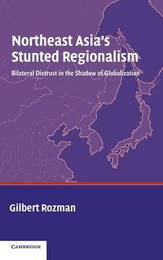
|
Northeast Asia's Stunted Regionalism: Bilateral Distrust in the Shadow of Globalization
Hardback
Main Details
| Title |
Northeast Asia's Stunted Regionalism: Bilateral Distrust in the Shadow of Globalization
|
| Authors and Contributors |
By (author) Gilbert Rozman
|
| Physical Properties |
| Format:Hardback | | Pages:412 | | Dimensions(mm): Height 229,Width 152 |
|
| ISBN/Barcode |
9780521835657
|
| Classifications | Dewey:327.095 |
|---|
| Audience | | Professional & Vocational | | Tertiary Education (US: College) | |
|---|
|
Publishing Details |
| Publisher |
Cambridge University Press
|
| Imprint |
Cambridge University Press
|
| Publication Date |
21 June 2004 |
| Publication Country |
United Kingdom
|
Description
A comprehensive picture of the pursuit of regionalism across Northeast Asia in the 15 years following the Cold War. In each of six periods, the main dynamic of regionalism and the problems that slowed regionalism's advance are identified. The evolving strategies of China, Japan, South Korea, and Russia are examined, emphasizing the importance of bilateral relations while keeping in mind the globalizing US role. By focusing on debates in each country, most rarely covered in English, the book demonstrates how suspicion of neighbors and clashing strategies have undermined aspirations for regionalism. Only by learning the lessons of this transitional era will regionalism be placed on a stable footing. These include: fully embrace globalization while using regionalism for balance, work together in integrating North Korea while recognizing South Korea's pivotal role, compromise to allow China and Japan to share leadership, and focus on a long-term vision of Northeast Asia.
Author Biography
Gilbert Rozman is Musgrave Professor of Sociology at Princeton University. He is the author or editor of many books, including Japan and Russia: The Tortuous Path to Normalization, 1949-1999 (2000).
Reviews'This book is a must read for students of Asian international relations and regionalism. ... his book breaks new ground by tracing the process of identity formation and transformation and the interaction of identities ... Rozman's book is thus a much-needed correction to the prevalent parsimonious scholarship of economists or realists who assume certain human nature and interests, ... Rozman provides common themes to organize his nuanced analysis of the intricate interplays between perceptions and realities ... Rozman makes a very strong statement, that is, national identities prevail over economics and security. ... Rozman's book will surely prepare one for the bumpy road ahead.' International Relations of the Asia-Pacific
|